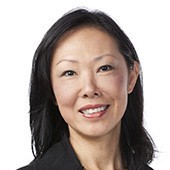Executive
 |
Carol Bennett, Chief Executive OfficerAs CEO, Carol oversees all of ACCAN's work and operations. She is a highly respected leader with a strong track record of delivering positive change for consumers and communities in all her previous CEO roles. She has outstanding expertise in strategic decision-making, communications, advocacy, stakeholder management, financial performance, collaboration building, government relations and corporate governance. Carol has held senior executive and board positions with national peak bodies in the health sector. Most recently, she was CEO of the Alliance for Gambling Reform from 2021 until commencing at ACCAN in mid-2024. |
|
 |
Gareth Downing, Deputy Chief Executive OfficerGareth oversees a team responsible for ACCAN’s policy work, community engagement and membership. His career has focused on policy and regulation and he has worked on policy across a number of regulated sectors including telecommunications, energy and water. Gareth is committed to advancing consumer’s interest through his leadership of ACCAN’s policy team. Gareth has previously sat on the ACCAN board, and prior to that worked for ACCAN in the role of Senior Policy Analyst providing advice on a wide range of policy, economic regulation and pricing matters. Gareth holds tertiary qualifications in policy, economics and law. |
|
Staff
|
|
Joanna IfieldJoanna Ifield is ACCAN’s Director of Policy. Joanna has worked in senior leadership roles in financial services consumer protection regulation, including compliance monitoring under industry self-regulatory frameworks. She has had a long career in consulting, providing pricing and infrastructure economic regulation advice to regulated businesses in energy, water and transport sectors, as well as government agencies on regulatory policy and reform projects. Joanna has built strong relationships with consumer advocates and representatives, working collaboratively to improve outcomes for consumers.
|
|
 |
Alec BennettsAlec Bennetts is ACCAN's Media and Communications Officer. He oversees external ACCAN communications, including media releases, newsletters, website content, and member communications, and ensures ACCAN is well-represented in national and local media. Alec has previously worked in policy research and political communications. He holds a Bachelor of Arts from the University of Sydney.
|
|
 |
Elise AcklandElise has always had a keen interest in technology and harnessing its potential, particularly for people with disabilities and seniors. Living with a physical disability herself, Elise uses that lived experience and her keen interest in technology to empower people, encouraging them to seek out positive ways for assistive technology to enhance and support their lives. Elise’s knowledge and skills have been built up over decades of experience supporting Australians with internet access, assistive technologies, and communications devices. Her career has included supporting Australians with the switchover to digital TV, the rollout of digital radio, assisting people with different abilities to get online, and more recently in the nonprofit sector, training volunteer cancer survivors to use virtual meeting technology to share their important stories with Australian medical schools. The Accessible Telecoms project is a great fit to share her skills and knowledge with people who may be struggling to keep up with the advancements in telecommunications and assistive technology.
|
|
 |
Con GouskosCon Gouskos leads ACCAN’s work on telecommunications consumer protections. Con regularly engages with financial counsellors and community legal centres concerning telecommunications consumer protections. Con holds a degree in International Studies from the University of New South Wales and a Certificate IV in Government from TAFE. He is currently working towards a Master of Administrative Law and Policy at the University of Sydney.
|
|
 |
David HackDavid is a graduate policy and research officer working in ACCAN’s policy team to advocate on communications issues and provide coordination assistance for ACCAN’s grants program and commissioned research. David holds a Bachelor of Information Communication Technology from Western Sydney University and previously worked in the IT sector before an interest in economics and policy led to further studies in that field. He holds a graduate certificate in behavioural economics and will soon complete a Masters in Behavioural Economics from the University of Technology Sydney.
|
|
 |
Sam KininmonthSam Kininmonth leads the ACCAN policy team’s research work and engagement with the research sector. An experienced consumer advocate, Sam previously worked as a lecturer at the University of Melbourne and RMIT University. He holds a Bachelor of Arts (Honours) from Swinburne University of Technology and a Bachelor of Communication (Distinction) from RMIT University. Sam is completing a PhD on digital media and automation in the ARC Centre of Excellence for Automated Decision-Making and Society at RMIT University.
|
|

|
Rebekah PalmerRebekah Palmer is ACCAN's Communications and Policy Officer, leading social media and marketing efforts while supporting the organisation's communications strategy. She also contributes to the policy team, focusing on consumer protections. Rebekah holds a Bachelor of Communications (Honours) from the University of Technology Sydney.
|
|
 |
Dr Amelia RadkeDr Amelia Radke leads ACCAN's work on digital inclusion, with a particular focus on issues relating to the affordability and accessibility of services for First Nations Australians, regional, rural, and remote Australia, and vulnerable consumers. She has extensive experience in policy and research both in academic and non-government settings. She holds a Bachelor of Arts (Honours) in anthropology and a PhD in legal anthropology from the University of Queensland.
|
|
 |
Audrey ReochAudrey Isadora Reoch is Director of Economic Regulation and leads ACCAN’s engagement with NBN Co on their proposed expenditure, revenue, pricing and service levels for broadband services. Audrey has worked across several fields in infrastructure and regulatory economics through her work at ACCAN and the federal infrastructure and communications departments, where she represented Australia in the Universal Postal Union and International Telecommunication Union. She holds an MA in Social and Political Thought from the University of Sussex and an Honours Degree in Political Economy from the University of Sydney.
|
|
 |
Amelia PearsonAmelia Pearson is an economic policy officer focused on ACCAN's engagement with NBN Co, specifically addressing the economic aspects of broadband services. Amelia has a Bachelor of Politics, Economics and Philosophy and a Bachelor of International Relations from the Australia National University.
|
|
 |
Anabelle KeaneyAnabelle Keaney is ACCAN’s Social Media and Content Manager. With a background in media, marketing and graphic design, she enjoys bringing these disciplines together to craft compelling content in both a written and visual capacity. She holds a Bachelor of Media (Public Relations & Advertising) and Bachelor of Design (Honours) from the University of New South Wales and has studied Creative Writing at the University of Oxford.
|
|
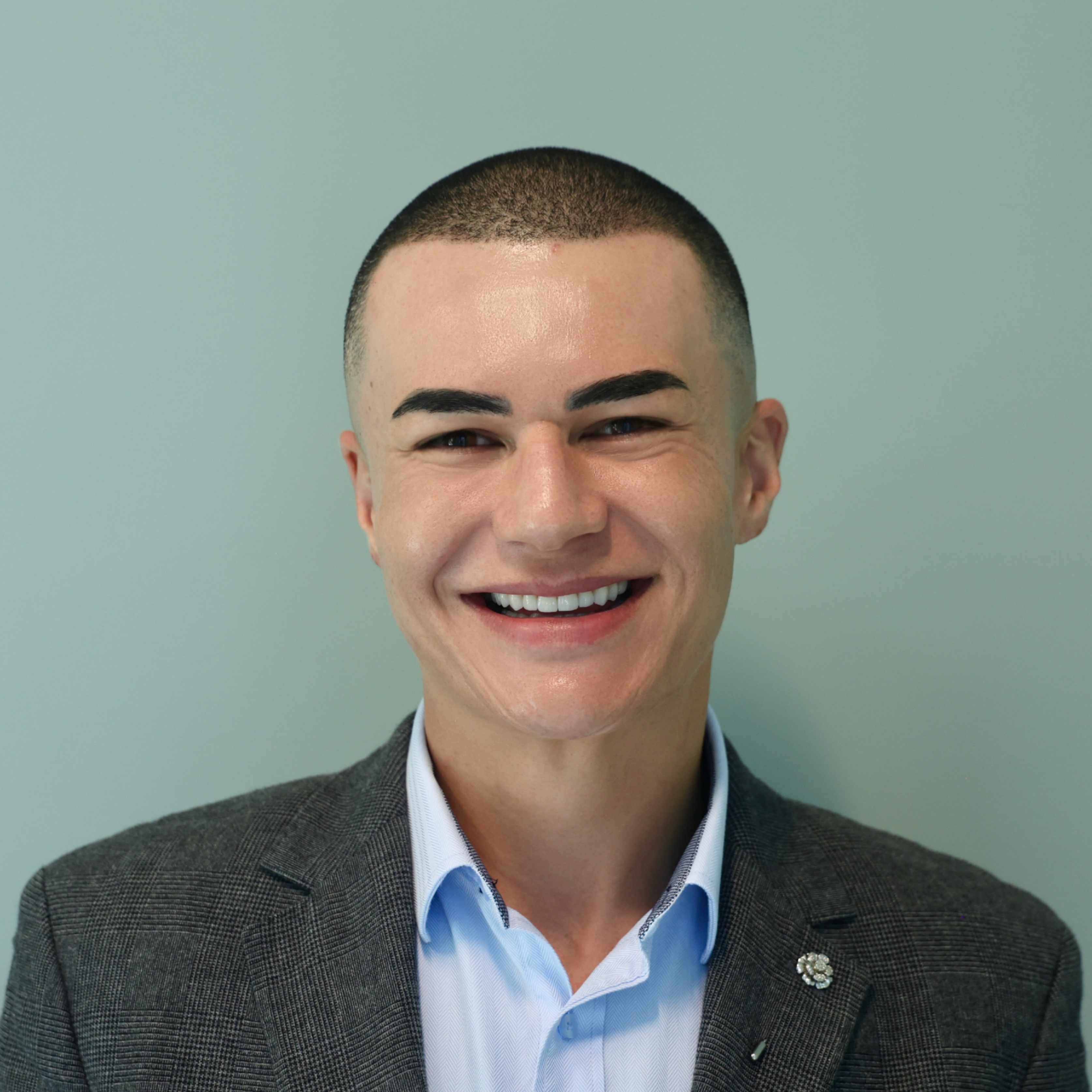 |
Ayden CastroAyden is a highly organised and results-driven Office Manager with extensive experience in office operations, administrative management, and executive support. At ACCAN, he plays a key role in streamlining workflows, enhancing productivity, and fostering a collaborative work environment that supports the organisation’s mission and leadership. |
As part of its consultation strategy, ACCAN has four Standing Advisory Forums. The four Standing Advisory Forums have replaced the previous Standing Advisory Committees that made up ACCAN's consultation framework – the Standing Advisory Committee on Consumer Affairs (SACCA) and the Standing Advisory Committee on Disability Issues (SACDI).
The new framework commenced in 2015 and will see each Advisory Forum meet annually. Additionally, where there are specific issues which require consultation, the ACCAN CEO may form Expert Advisory Committees.
- The Members Advisory Forum will focus across all the areas of ACCAN's activity and policy work.
- The Disability Advisory Forum will address issues regarding accessibility and suitability of communications services and products for Australians living with a disability.
- The Indigenous Advisory Forum focuses on Indigenous communications issues and suitability of communications services and products for Indigenous consumers.
- The Small Business Advisory Forum will work to ensure that the voice of small business consumers is heard in the telecommunications industry.
 |
Vince Humphries, Chairperson
Vince worked in communications regulation for over 30 years, most of that time with the Australian Communications and Media Authority (ACMA) and its predecessors. In his various roles, he dealt with most aspects of telecommunications regulation, together with regulation of online content, spam and telemarketing calls. In the area of telecommunications regulation, Vince led the ACMA’s efforts to drive a stronger emphasis on telco compliance with consumer safeguards, develop a range of consumer safeguards specific to the NBN, introduce publication of regular reports on complaints received by telcos and on how telcos deal with financial hardship, and a range of initiatives focusing on consumers in vulnerable circumstances. Vince lives in regional Victoria and has lived experience of some of the challenges in having reliable access to quality communications services in regional areas.
|
 |
Delia Rickard PSM, Deputy Chairperson
Delia has worked in consumer protection for 30 years, the last 10 or which were as the Deputy Chair of the ACCC. In that role she sat of the ACCC’s Communications and Enforcement committees, was a member of their Digital Platforms board as well as participating in multiple areas involving consumer protection. Her passions include stopping scams and creating a more equitable & sustainable society. She also previously worked senior roles at ASIC where one of her main focuses was financial capability. In 2011 she was awarded the Public Service Medal for ‘outstanding public service in the development of consumer protection for financial services’. She has also been awarded the SOCAP Lifetime Achievement award and in 2022 the Inaugural Australian Law Council’s Australian Consumer Rights award. Delia is currently involved with a range of not for profit organisations including the Australian Financial Complaints Authority; Super Consumers Australia; Good Shepherd’s financial inclusion action plans and the Jan Pentland foundation.
|
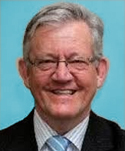 |
Keith Besgrove
Keith has extensive communications policy/regulatory qualifications after fifteen years as a senior manager in the Department of Communications (2000-2014). During that time, he was pivotal to ACCAN's establishment; to securing its initial funding; and in shepherding ACCAN through subsequent government, four-year reviews. Keith has a very wide range of experience of issues relevant to ACCAN. Aside from his work on consumer and disability issues, he developed Australia's first cyber security strategies; over sighted the creation of auDA; crafted legislation to combat spam and internet gambling; established the Do Not Call Register; helped adopt broadband in healthcare and education; managed spectrum sales; and reviewed the TIO. He was responsible for regional and indigenous communications issues for seven years including the second Regional Telecommunications Independent Review Committee, and managed installation of satellite phones and wi-fi points of presence in remote indigenous communities. Since leaving the Department in 2014, he has worked with many not-for-profit groups, including Financial Counseling Australia and spent 3 years as an advocate at Energy Consumers Australia. He is a Chair of the Funding Committee for Dragon Claw -- a web-based service for rheumatoid arthritis sufferers; a member of the board of an arts company, the CAD Factory; and a governing member of auDA. He is a vice-Chair of Internet Australia, and a member of the ACS’ Profession Advisory Board.
|
 |
Bobbie Blackson
Bobbie is a longstanding member of the Australian Deaf community and has been involved in various paid and non-paid capacities across disability/not-for-profit/government/tertiary sectors spanning 40 years. This has included being the Chair of Deaf Australia, the Chair of Deaf Connect, a member of the Australian Disability Advisory Council as well as a number of state and local organisations. She is a life member and Emeritus Chair of Deaf Connect. She was a co-founder of Deaflink which saw Australia’s first consumer-driven relay service eventually servicing all of Queensland. Deaflink merged with Deafness Resources Australia to form Australian Communication Exchange which provided the first National Relay Service. Bobbie has witnessed and supported deaf and hard of hearing people face the challenges of dealing with various traditional and interactive media platforms. Communication technology is potentially an enabler, but also poses many new barriers. Bobbie lives in rural SE Queensland and has experienced the challenges of adequate reliable communications services. Initially trained as a social worker, she has also gone on to be a Justice of the Peace (Qual), a civil marriage celebrant and is a member and Graduate of the Australian Institute of Company Directors. Bobbie has lived experience of challenges of navigating life as a deaf person in a hearing focussed, and now voice-activated world.
|
 |
Chris Dodds
Chris has been involved in the Community Service Industry for over 40 years in both a paid and volunteer capacity. This has included work as a childcare worker in a Women's Refuge, Coordinator at a Neighbourhood Centre and teaching at both TAFE and University. He served on the Board of NCOSS for 14 years including four year (2002-6) as President. He also served on the Board of ACOSS for eight years including five years on the Executive. Chris represents ACOSS on and is also Chairperson of Telstra's Low Income Measures Assessment Committee (LIMAC) which oversees $200 million of assistance provided by Telstra to low income customers each year.
|
 |
Daniel Featherstone
Daniel is a passionate advocate for equitable access to affordable and reliable communications services, with over 20 years of experience in media, communications, and digital inclusion, particularly in remote First Nations communities. Since 2021, Daniel has led the ‘Mapping the Digital Gap’ project at RMIT University, supporting the goal of First Nations digital equity by 2026. Daniel brings first-hand experience from regional Victoria and central Australia, where he managed Indigenous media organisations and initiated programs like inDigiMOB. A long-time supporter of ACCAN, Daniel contributes to policy submissions and advocacy efforts, and is eager to further support ACCAN’s mission on the Board.
|
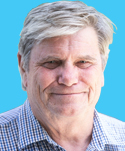 |
David Havyatt
David had a 35-year career in telecommunications that was structured in the reverse to many others. Post University he started as a clerk in old fashioned customer account teams, worked his way up to General Manager roles in Sales and Strategy, then morphed into a regulatory specialist before ending up in a Minister's office. Post his telco career he spent five years as Senior Economist at Energy Consumers Australia and after retiring spent the last three still focussed on energy consumer issues. He brings to ACCAN extensive governance and regulatory experience. His regulatory experience has been primarily in industry, though he was particularly focussed on roles improving consumer experience. He served on the Boards of CommsAlliance, AMTA and the TIO as well as being Chair of the Board of Endeavour Credit Union and the Glen Street Theatre. David prides himself on being a creative thinker who looks for the less obvious answers to “wicked” problems.
|
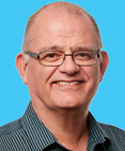 |
Robert Morsillo Robert brings over four decades of expertise in not-for-profit governance and extensive experience in telecommunications and consumer advocacy. Robert’s diverse educational background, which includes a BSc, an MA in Communications, and a focus on community development and public policy, uniquely positions him to contribute to ACCAN’s mission. He brings 40 years of experience in governance roles across various organizations, including Infoxchange, 28 years at Telstra in consumer affairs and digital inclusion, and 15 years in community work. As a research fellow and PhD student at RMIT, specialising in digital social innovation, Robert is committed to fostering cross-sector collaboration to enhance communication access for vulnerable groups. Through his involvement with the ARC Centre of Excellence for Automated Decision-Making and Society, he aims to bring valuable insights into the social impacts of emerging technologies, ensuring ACCAN continues to advocate for those at risk of exclusion in our rapidly evolving digital landscape.
|
 |
David Spriggs David Spriggs is the CEO of Infoxchange, a not-for-profit social enterprise with the vision of ‘technology for social justice’. He is passionate about creating a more digitally inclusive society and the role technology can play in improving the efficiency and effectiveness of the not-for-profit sector. In addition to his role at Infoxchange, David is Chair of the Australian Digital Inclusion Alliance (ADIA) and Deputy Chair of Specialisterne Australia, working to create careers for people on the autism spectrum. David is also a Non-Executive Director of the Alannah & Madeline Foundation, a charity dedicated to keeping children and young people safe from violence wherever they live, learn and play. David holds a Bachelor of Information Technology from the University of Queensland, a Certificate in Theology from Trinity College at the University of Melbourne and is a Graduate of the Harvard Business School Executive Education Program and the Australian Institute of Company Directors. |
The Australian Communications Consumer Action Network (ACCAN) is Australia’s peak communications consumer organisation representing individuals, small businesses and not-for-profit groups as consumers of communications products and services. ACCAN focuses on goods and services encompassed by the converged areas of telecommunications, broadcasting, the internet and online services, including both current and emerging technologies.
We aim to empower consumers to make good choices about products and services. As a peak body, ACCAN will represent the views of its broad and diverse membership base to policy makers, government and industry to get a better outcome for all communications consumers. Member groups include community legal centres, disability advocates, indigenous organisations, financial counsellors, regional organisations, farmers’ federations, parents groups, seniors organisations and other individual members.
The operation of ACCAN is made possible by funding provided by the Commonwealth of Australia under section 593 of the Telecommunications Act 1997. This funding is recovered from charges on telecommunications carriers.
ACCAN administers a Grant Program as part of its funding agreement with the Commonwealth Department of Communications. The aims of the Program are to support consumer research and representation that is aligned with ACCAN’s strategic plan.
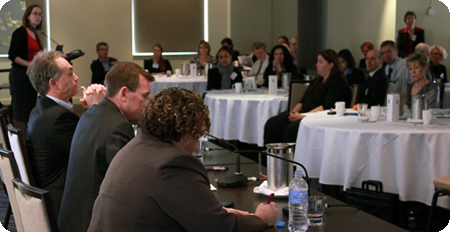
As part of our commitment to community and industry consultation, ACCAN runs a number of events each year. Our current and upcoming events can be found on this page. ACCAN encourages its Members to profile their communications events through our website.
If you would like any further information regarding our events, or to include your event on our site, please contact us.
You can see the speakers' presentations from the ACCANect 2018: Confidence in the connected world on the conference event page. If you are looking for information regarding past events it can be found in the events archive.
ACCAN acknowledges the need to actively promote equal access to all ACCAN events, consultations, submissions and other information. This reflects our principles of equal access and meaningful inclusion of people with disability. ACCAN strives to be a model in this field, for other not-for-profits, industry and government.
ACCAN endeavours to maintain its website in accordance with the WCAG 2.2AA guidelines and WCAG2.2AAA where possible. We welcome feedback on our content.

Change your text size
If you would like to increase the size of text you see on this website we recommend you use your web browser to zoom into the sites pages making the text larger while preserving the layout of the page. Here's how to do this for the most popular browsers;
Firefox
First, at the top of the Firefox window on the menu bar, click the View menu, scroll to the Zoom sub-menu and use the zoom controls as required.
Zoom with keyboard
- To increase the text size / zoom in, press and hold the "Ctrl" while pressing +.
- To decrease the text size / zoom out, press and hold Ctrl while pressing -.
- To reset your text size to default, press and hold Ctrl while pressing 0.
Mouse: If your mouse has a scroll wheel, press and hold Ctrl while scrolling up to decrease the text font size and down to increase it.
More about resizing in Firefox
Google Chrome
Open the "Customize and control Google Chrome" spanner icon (see image right). Use the Zoom controls to resize your text as required.
Zoom with keyboard
- To increase the text size / zoom in, press and hold the "Ctrl" while pressing +.
- To decrease the text size / zoom out, press and hold Ctrl while pressing -.
- To reset your text size to default, press and hold Ctrl while pressing 0.
Mouse: If your mouse has a scroll wheel, press and hold Ctrl while scrolling up to decrease the text font size and down to increase it.
More about resizing in Chrome
Microsoft Edge / Internet Exporer 7+
Zoom with keyboard
- To increase the text size / zoom in, press and hold the "Ctrl" while pressing +.
- To decrease the text size / zoom out, press and hold Ctrl while pressing -.
- To reset your text size to default, press and hold Ctrl while pressing 0.
In Internet Explorer 8 simply use the Magnifying glass in the bottom right corner of your browser frame.
More about resizing in Internet Explorer 8
More about resizing in Internet Explorer 7
Internet Explorer 6
To adjust the text size:
- Select menu item View > Text Size
- Click on the desired size. (The dot indicates the one currently selected.)
A B C D E F G H I J K L M N O P Q R S T U V W X Y Z
The purpose of the Members Advisory Forum (MAF) is to discuss the most important issues from the perspective of ACCAN's members and the people they represent, with a view to incorporating these into ACCAN's work priorities.
The purpose of the Small Business Advisory Forum (SBAF) is to discuss the most important telecommunications consumer issues from the perspective of key representative in the small business environment and the people they represent, with a view to incorporating these into ACCAN's work priorities.
The purpose of the Indigenous Steering Committee (ISC) is to discuss the most important telecommunications consumer issues from the perspective of key representative in the Indigenous consumer/community's environment and the people they represent, with a view to incorporating these into ACCAN's work priorities.
The purpose of the Disability Advisory Forum (DAF) is to discuss the most important telecommunications consumer issues from the perspective of key representative in the disability sector, with a view to incorporating these into ACCAN's work priorities.
The function of the Disability Advisory Forum is to:
2023-24 Annual Report
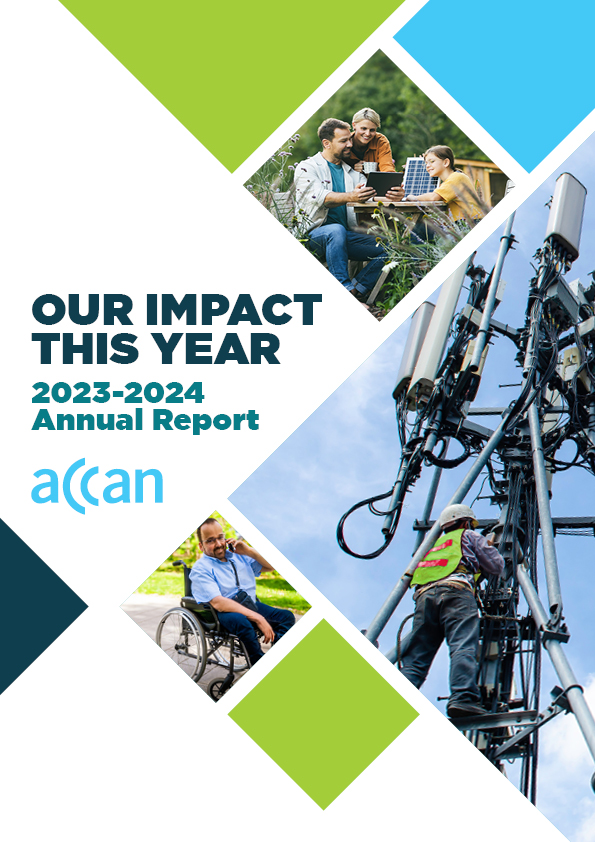 CEO Report, Carol Bennett
CEO Report, Carol Bennett
I am pleased to present ACCAN’s Annual Report for 2023-24.
When I commenced as CEO of ACCAN in early July this year, my focus was on contributing to the national effort to improve access, affordability and functionality of communications for all Australians. No small task, but I am pleased to say ACCAN has continued its outstanding work in support of equitable access to fundamental services that enable Australians to build and sustain social connections, work productivity, health and safety. It’s hard to imagine a more important area when it comes to improving quality of life for consumers.

